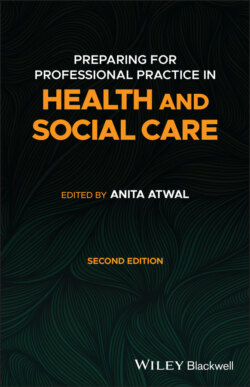Читать книгу Preparing for Professional Practice in Health and Social Care - Группа авторов - Страница 19
Reflective Models, Settings, and Tools
ОглавлениеBeing reflexive is essential for the advancement of professional practice. As is ever apparent with key national and international events, health and social care practitioners are having to demonstrate that they are capable of applying competencies and EBP in ever changing, complex, and often unfamiliar contexts. Individuals need to feel empowered to reflect on and question their own practice and the clinical reasoning of others, so that critical problem solving can lead to positive change for the wider community.
There are a wide range of models and tools available to practitioners to promote reflection. From the early work by Schön (1987) that highlighted both reflection in action and on action, based on the reflection of designers, an array of models have evolved for application in health and social care. Reflection-in-action occurs in the moment, whereas reflection-on-action occurs after the event and evaluates the situation through a staged process. The challenge is seeking practical strategies that push you further with your reflection to becoming reflexive, as well as being helpful to generate positive change within your profession and work context.
The HCPC, which is the professional regulator in the United Kingdom, give clear expectations of threshold standards regarding reflection that are in place to protect the public. All health and social care professionals are expected to reflect on and review their practice, although there are subtle differences between professions in terms of how this is expected to occur. This brings us on to valuing a range of approaches to reflection, whether this is an individual act or something undertaken with others. Core to each of the HCPC professional standards for proficiency is the need to ‘record the outcome of such reflection’ as outlined in Standard 11.1 for occupational therapists (HCPC 2018) highlighting that reflection, and documenting it, is essential to maintain professional registration within the United Kingdom.
There are a multitude of methods and settings where reflection can occur and these are outlined below.
Case conferences – although there is a need to shift from viewing these as meeting to only discuss a client, to actively considering how things can be delivered differently through interprofessional collaboration, debriefing, and simulation. This is supported by the HCPC through valuing multidisciplinary team reviews in standards of proficiency for example with dieticians (HCPC 2013a), paramedics (HCPC 2014), and chiropodists/podiatrists (HCPC 2013b).
Supervision – 1:1, with a peer, and within and across professions.
Debriefing – there are a range of techniques used as a means of facilitated, guided reflection as part of a debrief process. This can involve formal, structured techniques or more ad-hoc debriefing with peers, or facilitators, in pairs or groups.
Stakeholder meetings – these meetings are often strategic events to bring people together to discuss and commit to particular projects or developments (as in case study 1). This can be a great opportunity for reflection from multiple perspectives and may take a problem solving or appreciative inquiry (exploring strengths) focus.
Individual methods – reflective questions, diaries, reflective models (see case study 2), engaging in post-graduate study (case study 3), and as technology evolves, using mobile apps.
Schwartz rounds – The principles of Schwartz rounds are discussed in Chapter 2 (Care and Self-Care).
